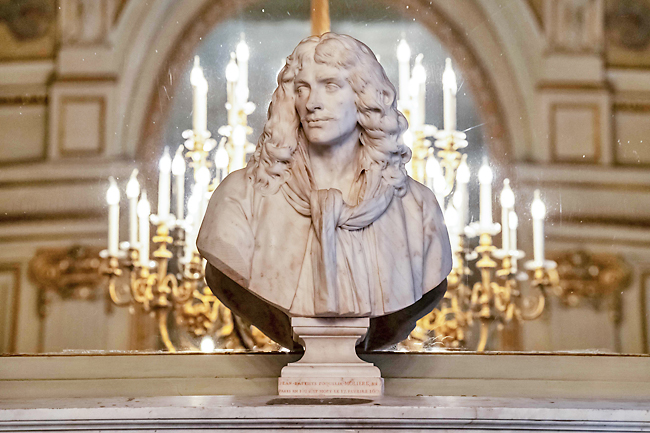PARIS (AFP) – United States (US) actor Denis O’Hare could sense the ghost of Moliere smiling as he rode his co-star Olivia Williams like a horse on stage at London’s National Theatre.
Usually a rather cerebral place, the National’s audience was in stitches as O’Hare’s character Tartuffe, from the classic 17th-Century French play, tried to disguise his antics as a bit of horseplay.
“The comedy translates across the centuries if you know what you’re doing,” O’Hare told AFP.
“Some of the funny was based on language, and some of it on sheer idiocy… But there are also great moments of pathos and human emotion that make it all the richer.”
That hit production of Tartuffe in 2019 was a reminder that Moliere, France’s most celebrated playwright who turns 400 this week, can resonate in the land of Shakespeare.
It was not always the case.
“It used to be a box office manager’s nightmare to have a Moliere production. You often had more people on stage than in the theatre,” said Noel Peacock of the University of Glasgow, an expert on Moliere translations. In the 1980s, one Sunday Times critic even feared that Moliere was an obstacle to a united Europe: “How can you trade freely with a nation whose best comedy does not travel?”


But since those times, there has been a “complete turnaround”, said Peacock.
There have been dozens of British productions in recent years – three major versions of Tartuffe in London alone between 2016 and 2019.
He is attracting celebrities: Keira Knightly played in The Misanthrope in 2009 and David Tennant (of Doctor Who fame) in Don Juan in 2017. Peacock credits fresh translations that worried less about linguistic accuracy than capturing Moliere’s spirit with helping to bring out the universal truths in his work.
“Great plays last for a reason,” agreed O’Hare.
“Tartuffe is a rogue and a rascal. But he’s also a truth-teller in the great tradition of the French clown. He upends society’s norms and conventions.”
That has made him highly adaptable to modern scenarios.
The Royal Shakespeare Company recently relocated Tartuffe to a British-Pakistani family in Birmingham.
The Exchange Theatre, a French-English company based in London, has just released a documentary about its version of The Misanthrope, which it set in a modern-day newsroom to highlight Moliere’s focus on truth and lies.
“The fact that he so vehemently criticised the falseness and liars in the world is one part of what makes his work survive so well,” said the company’s French-Mauritian director David Furlong.
He highlighted the famous, sarcastic monologue about hypocrisy in Don Juan (“To act the part of a good man is the best part one can act”) as the sort of speech that will be eternal.
“I’ve wondered in the past if it’s just my French education that tells me Moliere is a genius,” Furlong said. “But I don’t think so. There are so many faces to Moliere, he’s so rich and diverse, does comedy as well as he does tragedy, silly farces as well as highly philosophical plays. He speaks to everybody.”
It’s not just the English-speaking world that has embraced Moliere of late: translations have proved popular in Germany, Russia, Japan and beyond. A recent French book about Moliere in the Arabic world found he had been performed in the region since at least 1847 and had become the “godfather of theatre” in many countries.
“Moliere’s plays have been extremely important internationally. He even provided the foundation for some national theatres who adapted his plays to their local languages and cultures,” said conservator of the Comedie-Francaise in Paris Agathe Sanjuan.








